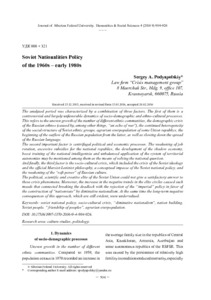Показать сокращенную информацию
Soviet Nationalities Policy of the 1960s – early 1980s
| Автор | Podyapolskiy, Sergey A. | en |
| Автор | Подъяпольский, С.А. | ru_RU |
| Дата внесения | 2016-04-30T00:07:52Z | |
| Дата, когда ресурс стал доступен | 2016-04-30T00:07:52Z | |
| Дата публикации | 2016-04 | |
| URI (для ссылок/цитирований) | https://elib.sfu-kras.ru/handle/2311/20202 | |
| Аннотация | The analyzed period was characterized by a combination of three factors. The first of them is a controversial and largely unfavorable dynamics of socio-demographic and ethno-cultural processes. This refers to the uneven growth of the number of different ethnic communities, the demographic crisis of the Russian ethnos (caused by, among other things, “an echo of war”), the continued heterogeneity of the social structure of Soviet ethnic groups, agrarian overpopulation of some Union republics, the beginning of the outflow of the Russian population from the latter, as well as slowing down the spread of the Russian language. The second important factor is centrifugal political and economic processes. The weakening of job rotation, excessive subsidies for the national republics, the development of the shadow economy, boost training of the national intelligentsia and unbalanced application of the system of territorial autonomies may be mentioned among them as the means of solving the national question. And finally, the third factor is the socio-cultural crisis, which included the crisis of the Soviet ideology and the official Marxist-Leninist philosophy, a conceptual impasse of the Soviet national policy, and the weakening of the “soft power” of Russian culture. The political, scientific and creative elite of the Soviet Union could not give a satisfactory answer to these crisis phenomena. Moreover, the increase in the negative trends in the elite circles caused such moods that connected breaking the deadlock with the rejection of the “imperial” policy in favor of the construction of “nationstate” by diminutive nationalism. At the same time the long-term negative consequences of this approach, which are still evident, were undervalued | en |
| Аннотация | Анализируемый период характеризовался сочетанием трех факторов. Первый из них – противоречивая и во многом неблагоприятная динамика социально-демографических и этнокультурных процессов. Речь идет о неравномерном росте численности различных этнических общностей, демографическом кризисе русского этноса (вызванном в том числе «эхом войны»), сохраняющейся неоднородности социальной структуры советских этносов, аграрном перенаселении ряда союзных республик, начале оттока русского населения из последних, а также о замедлении темпов распространения русского языка. Второй важный фактор – центробежные политические и экономические процессы. В их числе следует назвать ослабление ротации кадров, избыточное дотирование национальных республик, развитие теневой экономики и форсированную подготовку национальных интеллигенций и несбалансированное применение системы территориальных автономий как средство решения национального вопроса. И, наконец, третий фактор – социокультурный кризис, включавший кризис советской идеологии и официальной марксистско-ленинской философии, концептуальный тупик советской национальной политики и ослабление «мягкой силы» русской культуры. Политическая, научная и творческая элиты Советского Союза не смогли дать удовлетворительного ответа на эти кризисные явления. Более того, по мере усиления негативной динамики в элитных кругах возобладали настроения, связывающие выход из тупика с отказом от «имперской» политики в пользу строительства «национального государства» путем уменьшительного национализма. При этом были недооценены долгосрочные негативные последствия такого подхода, дающие знать о себе и по настоящее время | ru_RU |
| Язык | en | en |
| Издатель | Сибирский федеральный университет. Siberian Federal University | en |
| Является частью серии | Журнал Сибирского федерального университета. Гуманитарные науки. Journal of Siberian Federal University. Humanities & Social Sciences;2016 9 (4) | en |
| Тема | soviet national policy | en |
| Тема | socio-cultural crisis | en |
| Тема | “diminutive nationalism” | en |
| Тема | nation building | en |
| Тема | Soviet people | en |
| Тема | “ friendship of peoples” | en |
| Тема | agrarian overpopulation | en |
| Тема | советская национальная политика | ru_RU |
| Тема | социокультурный кризис | ru_RU |
| Тема | «уменьшительный национализм» | ru_RU |
| Тема | национальное строительство | ru_RU |
| Тема | советский народ | ru_RU |
| Тема | «дружба народов» | ru_RU |
| Тема | аграрное перенаселение | ru_RU |
| Название | Soviet Nationalities Policy of the 1960s – early 1980s | en |
| Альтернативное название | Советская национальная политика 1960-х – начала 1980-х гг. | ru_RU |
| Тип | Journal Article | |
| Тип | Published Journal Article | |
| Контакты автора | Podyapolskiy, Sergey A.:Law firm “Crisis management group” 8 Maerchak Str., bldg. 9, office 107, Krasnoyarsk, 660075, Russia; E-mail: spodyapolsky@yandex.ru | en |
| Контакты автора | Подъяпольский, С.А.:Юридическое агентство «Антикризисный центр» Россия, 660075, Красноярск, ул. Маерчака, 8, стр. 9, офис 107 | ru_RU |
| Страницы | 904-926 |

